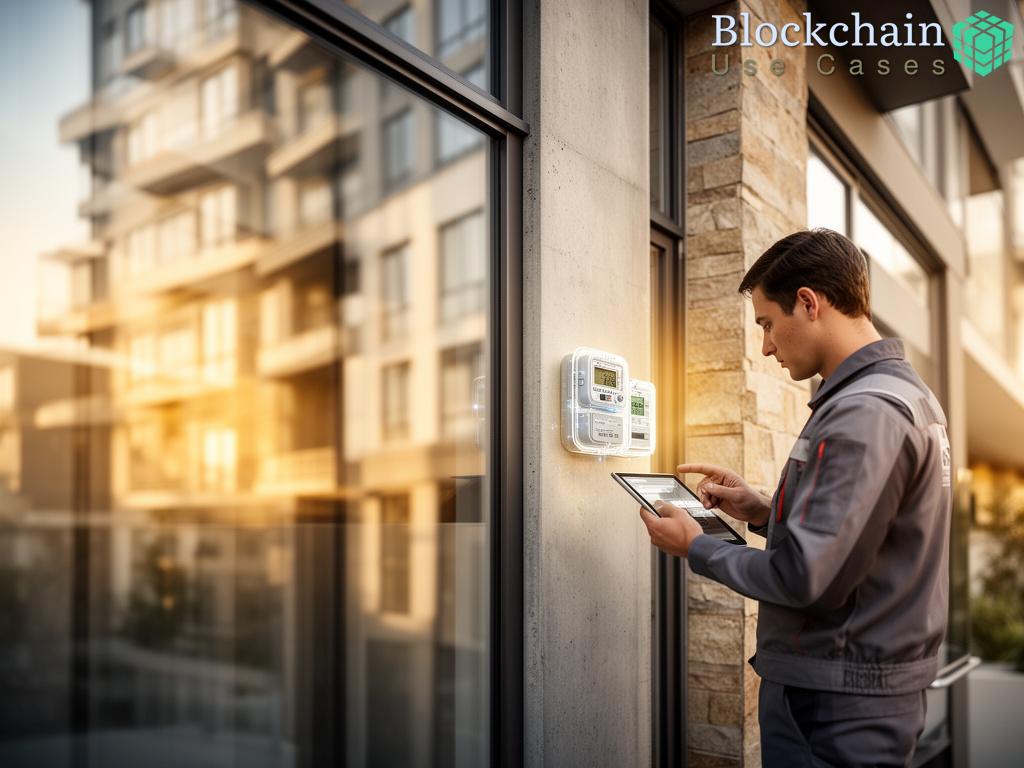Enhancing Transparency in Transactions

In the complex world of real estate, trust is paramount. Blockchain technology, with its decentralized ledger system, offers an innovative solution to enhance transparency in transactions. By eliminating the need for intermediaries and providing a tamper-proof record of all transactions, blockchain fosters a new level of confidence among stakeholders, including property managers, landlords, and tenants.
The implementation of blockchain in property management accounting systems brings several critical advantages that redefine the norms of transaction transparency. Here are some pivotal benefits:
- Immutable Records: Once a transaction is recorded on the blockchain, it cannot be altered or deleted, ensuring that all parties have access to a permanent and accurate history of ownership and transaction details.
- Real-Time Tracking: Blockchain allows for real-time updates to transaction data, enabling stakeholders to track the status of transactions instantly, reducing the risk of fraud.
- Smart Contracts: These self-executing contracts with the terms of the agreement directly written into code can automate processes, ensuring that all conditions are met before a transaction is confirmed.
Understanding the contrast between traditional real estate transactions and blockchain-enabled processes highlights the transformative potential of this technology. The following table summarizes key differences:
| Aspect | Traditional Transactions | Blockchain Transactions |
|---|---|---|
| Intermediaries | Required (e.g., brokers, notaries) | Eliminated or minimized |
| Transaction Time | Days to weeks | Minutes to hours |
| Transparency | Limited access to data | Public ledger accessible to all parties |
| Fraud Risk | Higher due to reliance on trust | Lower due to immutable records |
Streamlining Property Records Management
The introduction of blockchain technology into property management accounting systems is not merely an enhancement; it is a fundamental shift in how property records are handled. By leveraging the capabilities of a decentralized ledger, stakeholders can experience a significant transformation in the efficiency and accuracy of property records management. This innovation addresses long-standing challenges in the real estate sector, paving the way for a future where property management is both streamlined and transparent.
One of the most notable advantages of blockchain in managing property records is the elimination of redundancies. Traditionally, property records have often been fragmented across various systems, leading to inconsistencies and increased administrative burdens. With blockchain, all property records are stored in a single, immutable ledger that can be accessed and updated by authorized parties in real time. This not only enhances the accuracy of the data but also reduces the time spent on record maintenance and verification.
Furthermore, the integration of blockchain technology facilitates seamless communication among different stakeholders involved in property management. Whether it is landlords, tenants, or service providers, all parties can access the same information concurrently, ensuring everyone is on the same page. This level of transparency minimizes misunderstandings and disputes, fostering a more collaborative environment.
Additionally, the use of smart contracts within blockchain systems automates numerous aspects of property record management. For instance, lease agreements can be programmed to activate certain conditions automatically, such as rent payments or maintenance requests. This not only speeds up processes but also reduces the chances of human error, making the management of property records more efficient and reliable. In an industry where timely information is critical, leveraging blockchain technology can significantly improve operational workflows.
Automating Compliance and Reporting
In the ever-evolving landscape of real estate property management, compliance with regulatory standards and accurate reporting are paramount. The advent of blockchain technology is set to revolutionize how property managers approach these critical tasks. By automating compliance and reporting processes, blockchain not only enhances accuracy but also significantly reduces the time and resources required to meet regulatory demands.
Transforming Compliance Protocols through blockchain means that property managers can automatically track relevant regulations and changes in the law. The decentralized nature of blockchain enables real-time updates to compliance requirements, ensuring that all stakeholders are informed about any changes instantly. This proactive approach to compliance minimizes the risk of non-adherence and potential penalties, allowing property managers to focus on their core responsibilities rather than being bogged down by the intricacies of regulatory frameworks. Furthermore, the use of smart contracts can embed compliance checks directly into the transaction process, ensuring that all parties are compliant before a transaction is executed.
In addition to compliance, blockchain technology streamlines reporting processes. Traditional reporting methods often involve extensive manual data entry and reconciliation tasks, which can lead to errors and delays. Blockchain, with its immutable ledger, provides a single source of truth for all transactions, making it easier to generate accurate reports in real time. This capability is particularly beneficial during audits, as all transaction histories are readily accessible and verifiable. The efficiency gained through automation not only saves time but also enhances the credibility of financial reports presented to stakeholders.
The table below compares the traditional and blockchain-enabled approaches to compliance and reporting:
| Aspect | Traditional Methods | Blockchain Methods |
|---|---|---|
| Compliance Monitoring | Manual tracking, prone to errors | Automated updates, real-time information |
| Reporting Accuracy | Time-consuming, error-prone | Instant access to verified data |
| Audit Preparedness | Requires extensive preparation | Accessible records streamline audits |
As the real estate industry continues its digital transformation, the integration of blockchain technology into property management accounting systems marks a significant leap forward. By automating compliance and reporting, blockchain not only enhances operational efficiency but also instills a greater sense of trust among stakeholders. In this dynamic environment, property managers who embrace these innovations will be well-positioned to navigate the complexities of modern real estate management with confidence.
Facilitating Smart Contracts in Leasing
As the real estate sector increasingly embraces technological advancements, the integration of blockchain is set to transform traditional leasing processes profoundly. The advent of smart contracts within blockchain ecosystems offers a groundbreaking approach to managing leases, creating a seamless experience for all parties involved. These self-executing contracts, which are programmed to fulfill contractual obligations automatically, significantly reduce the complexities and risks associated with conventional leasing agreements.
In a conventional leasing scenario, numerous challenges arise, such as delayed payments, miscommunication between landlords and tenants, and the potential for disputes over terms. However, the incorporation of smart contracts addresses these issues head-on. By embedding the lease terms directly into the code, smart contracts ensure that all conditions are met before any action is taken, thereby fostering a more reliable and efficient leasing process. For instance, when a tenant submits a rental payment, the smart contract can automatically verify the transaction and initiate follow-up actions, such as issuing a receipt or notifying the landlord.
The transparency offered by blockchain further enhances the effectiveness of smart contracts in leasing. Both parties have access to the same information in real-time, which minimizes misunderstandings and builds trust. Additionally, each transaction is recorded immutably on the blockchain, providing a clear and verifiable history of all lease-related activities. This level of visibility not only protects the interests of both landlords and tenants but also simplifies any potential dispute resolution processes.
Moreover, the capability of smart contracts to automate various aspects of property management can lead to significant cost savings. The reduction or elimination of intermediaries, such as property managers or brokers, means that landlords can save on fees while tenants benefit from more straightforward and transparent leasing arrangements. As a result, property managers can allocate their resources more efficiently, focusing on value-added services instead of time-consuming administrative tasks.
In conclusion, the implementation of smart contracts in leasing through blockchain technology represents a remarkable shift in the real estate property management landscape. By facilitating automated, transparent, and secure leasing processes, smart contracts not only enhance operational efficiency but also cultivate a new standard of trust among stakeholders. As the industry continues to evolve, embracing these innovations will empower both landlords and tenants to engage in more productive and harmonious relationships.
Improving Financial Auditing Processes
In the realm of real estate property management, the integrity and accuracy of financial audits hold immense significance. The integration of blockchain technology is emerging as a game-changer, offering a robust framework that not only refines auditing processes but also elevates the overall financial governance of property management accounting systems. By establishing a transparent and immutable record of transactions, blockchain enhances the reliability of audits, instilling confidence among stakeholders and paving the way for a new era of accountability.
Transforming Audit Trail Accuracy is one of the most notable advantages of blockchain in financial auditing. Traditionally, audits rely heavily on documentation, which can often be subject to manipulation or errors. With blockchain, every transaction is recorded in real-time on a decentralized ledger, creating a comprehensive and unalterable audit trail. This shift ensures that auditors can access accurate data at any time, significantly reducing the chances of discrepancies. Consequently, auditors can focus their efforts on analysis rather than on reconciling inconsistencies.
Real-Time Data Accessibility revolutionizes the auditing landscape as well. Auditors historically faced challenges associated with delayed access to financial data, resulting in prolonged audit cycles. Blockchain technology bridges this gap by allowing auditors to access up-to-date information effortlessly. This immediacy not only accelerates the auditing process but also enhances the responsiveness of property management firms to any identified issues. As stakeholders demand more timely insights, blockchain’s capacity for real-time data sharing becomes an invaluable asset.
Moreover, automated compliance checks embedded within blockchain systems streamline the auditing process further. Smart contracts can be programmed to incorporate compliance requirements, ensuring that all transactions adhere to regulatory standards before they are executed. This proactive approach not only alleviates the burden on auditors to verify compliance post facto but also enhances the credibility of the financial reporting process. By integrating compliance directly into the transaction flow, blockchain minimizes the risk of non-compliance penalties and fosters a culture of accountability.
In summary, the transformation of financial auditing processes through blockchain technology represents a pivotal advancement in real estate property management. By reinforcing the accuracy of audit trails, facilitating real-time data access, and automating compliance checks, blockchain not only boosts operational efficiency but also cultivates an environment of trust among stakeholders. As the industry continues to evolve, embracing blockchain’s potential will be integral for property managers aiming to enhance their financial governance and uphold the highest standards of accountability.





